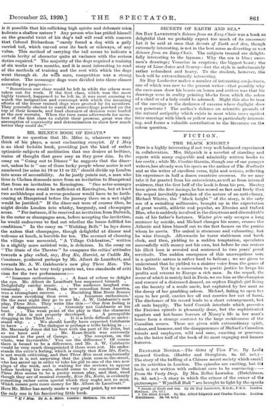MR. MILNE'S BOOK OF ESSAYS.*
THERE is no question that Mr. Milne is, whatever wo may Chink of his plays, a most enchanting essayist. If I May
is an ideal bedside book, providing just the kind of rather optimistic subjects of meditation that one desires at bedtime, trains of thought that grow rosy as they grow dim. In the essay on "Going out to Dinner" ho suggests that the diner- out, unless ho is " ono of those lucky people whose motor is not numbered (as mine is) 19 or 11 or 22," should divide up London into areas of accessibility. As he justly points out, a man who lives in Chelsea demands more from an invitation to Hampstead than from an invitation to Kensington. " One actor-manager and a rural dean would be sufficient at Kensington, but at least two archbishops and a revue-producer would have to be forth- coming at Hampstead before the journey there on a wet night would be justified." If the diner-out were of coarser fibre, he might divide London into whisky, burgundy, and champagne areas. " For instance, if he received an invitation from Dulwich, in the outer or champagne area, before accepting the invitation, he would endeavour to find out whether the house fulfilled his conditions." In the essay on " Wedding Bells " he lays down the axiom that champagne, though delightful at dinner and welcome at lunch, is horrible for tea. The account of choosing the village war memorial, "A Village Celebration," written in a slightly more satirical vein, is delicious. In the essay on
" The State of the Theatre " ho compares the critics' attitudes towards a play called, say, Hug Me, Harriet, or Cuddle Me, Constance, produced perhaps by Mr. Albert de Lauributt, and towards Mr. A. W. Galsbarrie's new play Three Men. The critics have, as he very truly points out, two standards of criti clam for the two performances :—
" ' Immense enthusiasm. . . A feast of colour to delight the eye. Mr. Albert de Lauributt has surpassed himself. Delightfully catchy music. . . The audience laughed con- tinuously. . Mr. Penis, the now comedian from America, was a triumphant success. . . Ravishing Miss Rosie Romeo was more ravishing than ever. . . Immense enthusiasm.' On the next night they go to see Mr. A. W. Galsbarrie's new
play, Three Men. They write like this Our first feeling is
one of disappointment. . . Certainly not Galsharrio at his best. . The weak point of the play is that the character of Sir John is not properly developed. . . A perceptible dragging in the Third Act. . . It is a little difficult to under- stand why. . . We should hardly have expected Galsbarrie to have . . . The dialogue is perhaps a trifle lacking in .. . Mr. Macready Jones did his best with the part of Sir John, but as we have said . . . Mr. Kean-Smith was extremely
unsuited to the part of George. The reception, on the
whole, was favourable.' You see the difference Y Of course there is bound to be a difference, and Mr. A. W. Oalsbarrie would be very much disappointed if there were not. Ho under-
stands the critic's feeling, which is simply that Kiss Me, Katie, is not worth criticizing, and that Three Men most emphatically
is. But it is not surprising that the plain man-in-the-street, who has saved up in order to take his girl to one of the two now plays of the week, and is waiting for the reviews to appear
before booking his seats, should come to the conclusion that Three Men seems to be a pretty rotten play, and that, tired though they are of musical comedy, Kiss Me, Katie, is evidently something rather extra special which they ought not to miss. Which means pots more money for Mr. Albert de Lauributt." Here Mr. Milne has surely made a very good point, by no means the only one in his fascinating little book.
• I Mom. By A. A. Mine. London: Methuen. Iflu net.?


































 Previous page
Previous page